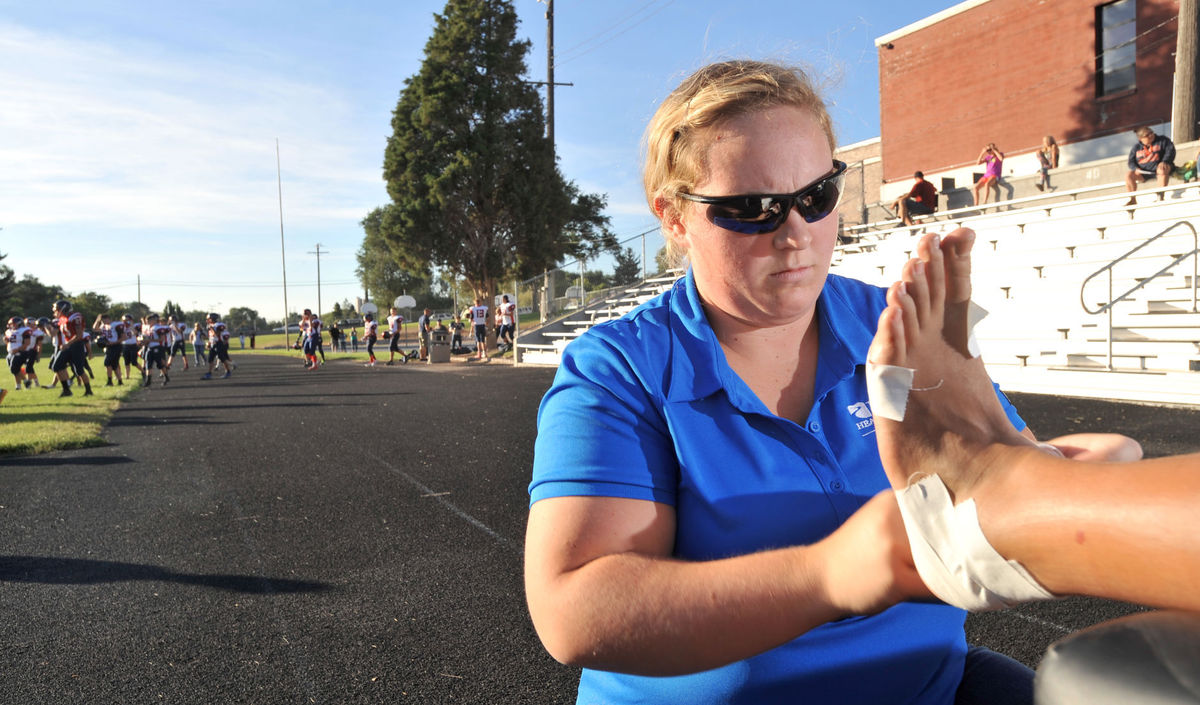
Article reposted from Idaho State Journal
Author: Jeff Papworth
Many sounds fill the air in any given football game. Coaches scream instructions, chains rattle after first downs are attained, fans chant, pads clash and the public announcer provides a description of what’s transpiring on the field.
Drowned out is an individual who may be with a player on the sidelines, asking them questions and checking them out before providing a diagnosis and treatment. The person performing those tasks is the athletic trainer, who’s below the stands with the players, referees, coaches, chain gang, cheerleaders and whoever else populates that area.
Among those mentioned, the trainer is the most important in one aspect of football — a player’s safety.
For the second season, those who are the athletes’ advocates — as athletic trainers call themselves — for Pocatello’s football teams are Britt Dickman, Clarissa Alexander and Kurt Scheiss. Dickman, 23, is the lead athletic trainer for Century sports teams, while Alexander covers Pocatello and Scheiss is at Highland.
The start of practice about two weeks ago was when they entered the throngs of another season of football — one of the most physical high school sports, which a spotlight has been aimed at for its health risks, such as concussions. The sport also happens to draw great popularity, meaning more people are invested in the athletic trainers’ decisions on whether to sit players out or not.
The Poky athletic trainers do not enter the situation with timidity. In fact, they welcome the challenges of football.
“Football’s my rush,” Dickman said. “It’s my sport that is my high. I just love the intensity of the game. On a medical standpoint, I love that it’s a sport where I feel needed.”
The trainers all come through the prism of football fans, so no one is taken aback by their surroundings during games. Dickman remembers attending her first University of Montana football game at the 20,000-plus seat Washington–Grizzly Stadium as a freshman in high school. She loved the unity that was shared by all. Alexander, 23, has had her own experiences, including sitting in the nosebleeds at Albertsons Stadium as a child, wearing a cheerleading uniform and watching the game with her father. Scheiss, 33, was on the Teton High School football team, serving predominantly as an offensive tackle.
Their designated location as trainers is not the playing surface nor stands in local football games, but rather what Alexander called a NASCAR pit area that is the sidelines where so much unfolds. Sometimes, they will be encircled while treating a player in the middle of a sideline huddle.
Another scenario may feature a coach yelling at the trainer for keeping a player out.
“Anything that happens in game time, you’ve got to let it go,” Alexander said. “In that moment, they’re yelling at everybody. And so if they turn and yell at you, when you say I’m holding him out, it’s not you they’re yelling at.’”
Every task the athletic trainers perform on the sideline, whether it’s a discussion with a coach or treating a player, must be as quick as it is productive.
“My primary focus is going to be what’s going on, on the field,” Scheiss said. “And even if we’re taking care of someone on the sideline, we still have to be watching the field.”
While watching, Scheiss said it is as important to listen. Sometimes, he can hear when something doesn’t sound quite right.
It doesn’t hurt to use all senses with a football game’s infinite outcomes.
“You can have anything. Any injury from an ankle sprain to sudden cardiac arrest,” Dickman said. “We have to be trained in that and know. And I worry every time somebody gets hit hard or hit wrong.”
Pocatello athletic director Robert Parker praised Alexander for her swiftness when she saw a booming collision last year in a game against Blackfoot.
“I’m sitting on the sideline talking to her and I kid you not, this kid gets freaking hit hard and I think she was on the field before the kid hit the ground,” said Parker. “She just saw the hit, knew it was coming.”
Dickman had her own moment last year that tested her when Century played at Skyline. Kids were going down left and right. She said she was running around nonstop, though she said she did not feel panicked during the juncture.
“My skills just kicked in,” Dickman said. “I didn’t have a second to think, but yet I did everything I was supposed to do.”